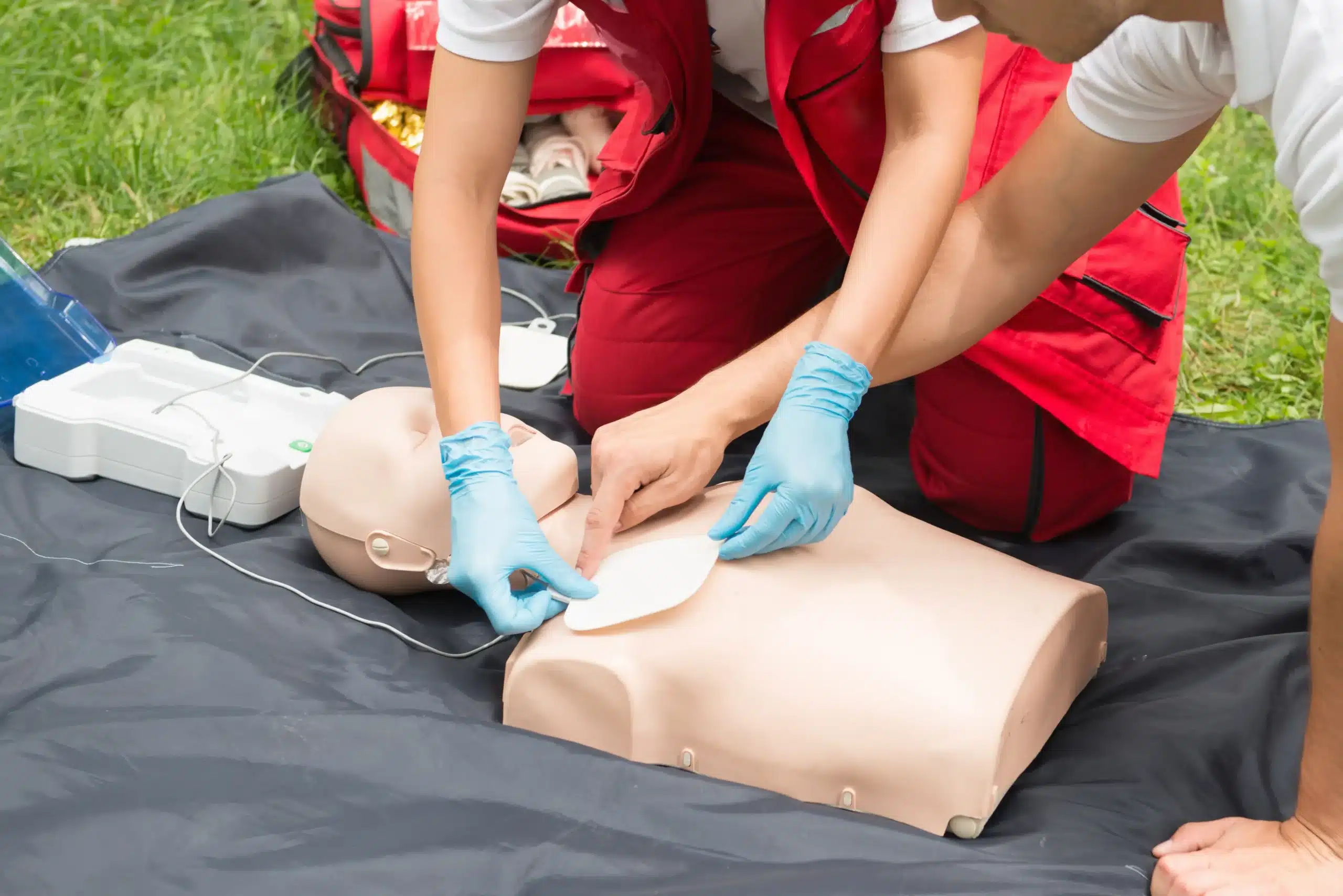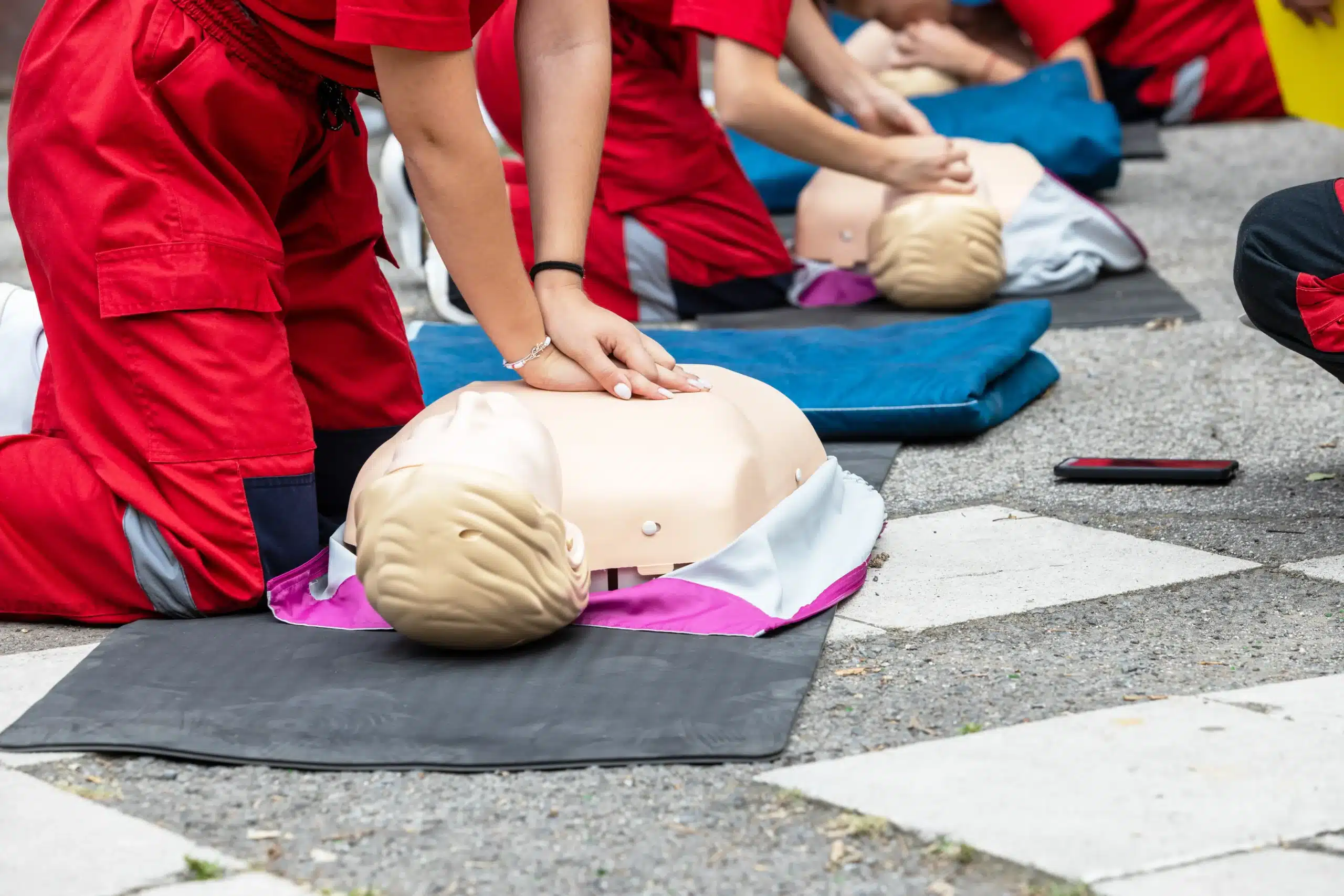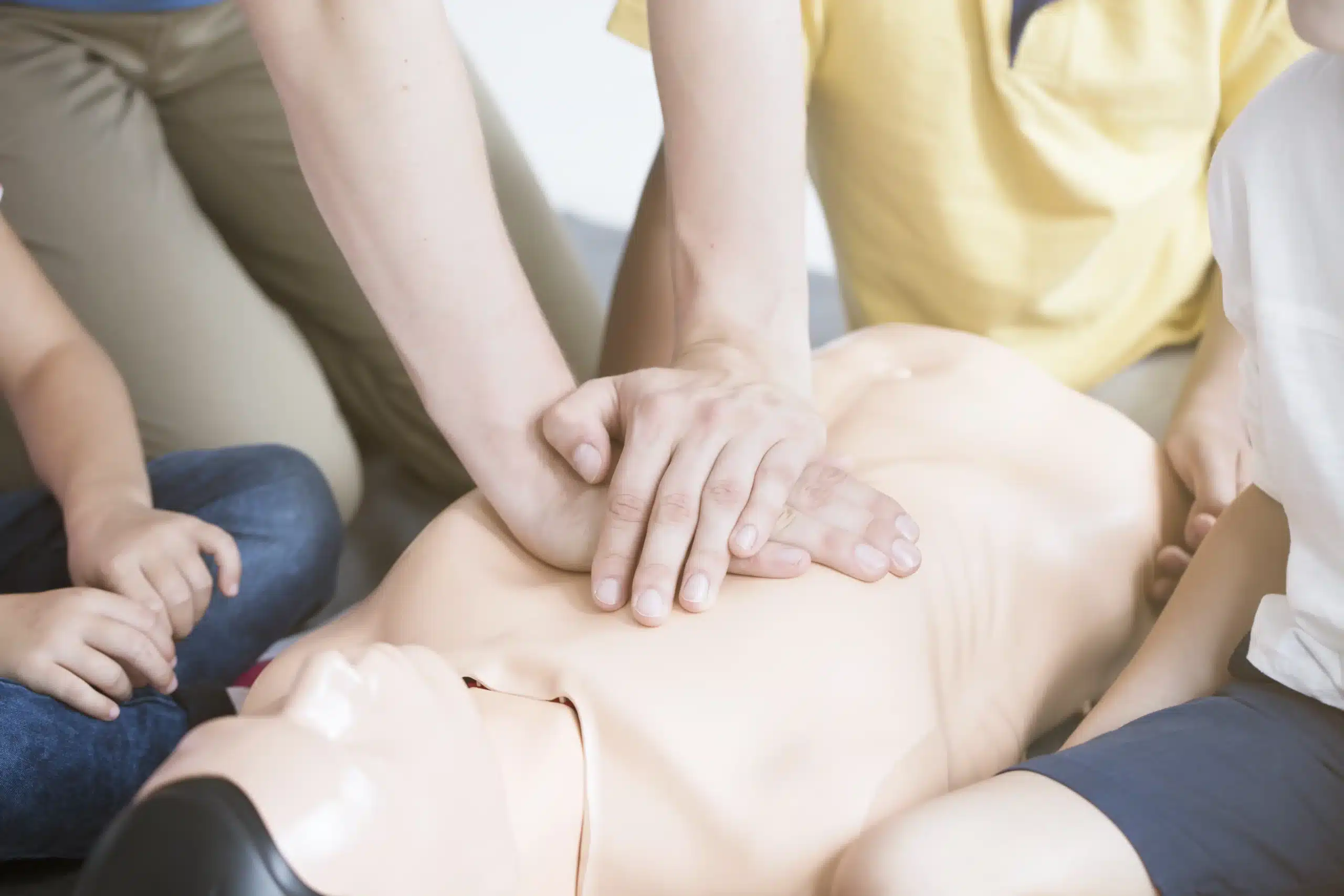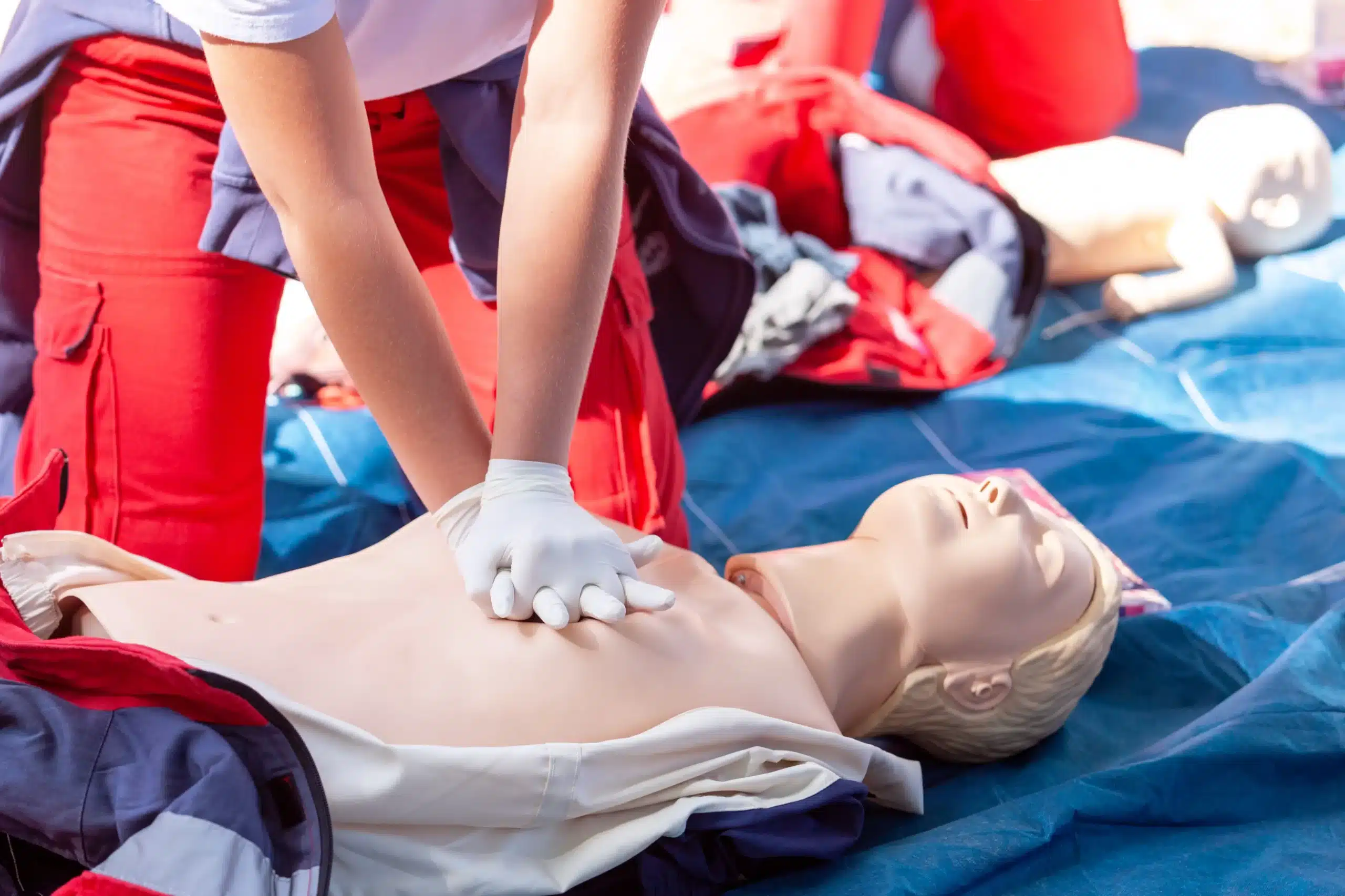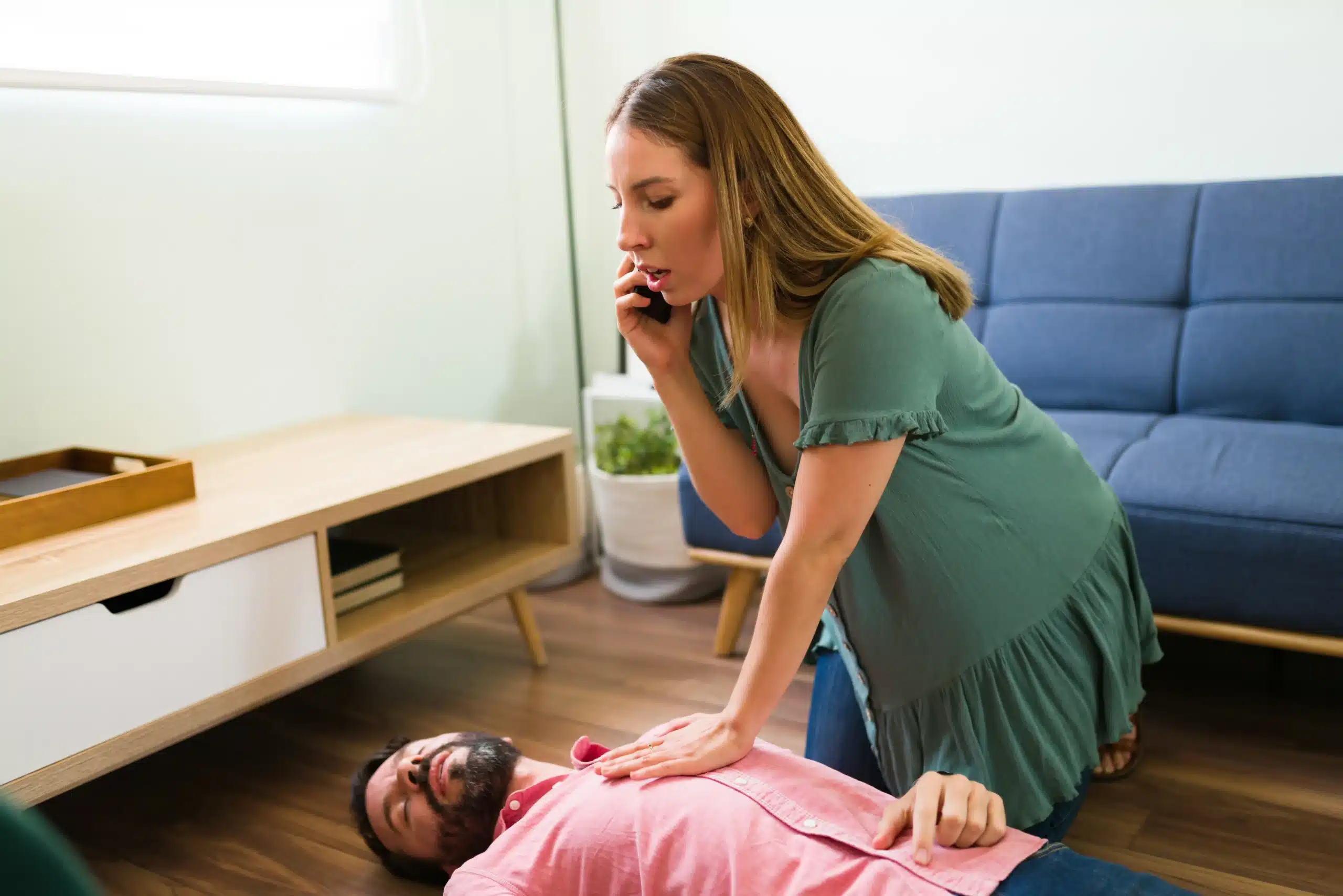Empowering yourself with life-saving skills has never been easier, thanks to the rise of online CPR classes in Madera. This article provides a comprehensive overview of online CPR training, addressing common questions and concerns. We’ll explore the various types of online CPR certifications available in Madera, discuss the advantages of online learning, and guide you through choosing the right course for your needs. We’ll also compare online and in-person training, discuss pricing and discounts, and provide valuable tips for preparing for your online CPR class. Whether you’re a healthcare professional, a student, or a community member, this guide will help you navigate the world of online CPR training and become a confident first responder.
Key Takeaways
- Online CPR training blends convenience with hands-on learning: Study the course material at your own pace online, then attend an in-person skills session to practice with a certified instructor. This flexible format makes learning life-saving skills accessible for even the busiest schedules.
- Choose the right certification for your needs: From basic CPR and First Aid to advanced certifications like BLS, ACLS, and PALS, understanding the different options ensures you gain the right skills for your personal or professional goals.
- Select a reputable provider for a valid and accepted certification: Look for accreditation from organizations like the American Heart Association and confirm the certification’s validity period. Compare pricing and explore available discounts, like those offered by Fresno CPR Classes, to find the best value for your training.
What are Online CPR Classes in Madera?
Online CPR classes in Madera offer a flexible way to learn life-saving skills. These courses typically blend online learning with in-person skills practice. You’ll work through the course material at your own pace, then attend a hands-on session to practice your skills with an instructor. Many providers in Madera, like Fresno CPR Classes, offer blended learning courses covering certifications such as Basic Life Support (BLS), Advanced Cardiac Life Support (ACLS), and Pediatric Advanced Life Support (PALS). These courses, which also include CPR and First Aid, often use interactive tools, like voice-activated manikins, to enhance the learning experience and give students immediate feedback. This blended format is especially helpful for busy professionals, allowing them to fit the coursework around their schedules. For example, someone working in Madera’s agricultural industry could complete the online modules during their downtime and then schedule the practical skills session at their convenience. Ultimately, online CPR classes provide an accessible and effective path to certification, preparing individuals to respond confidently in emergencies.
Available Online CPR Certifications
Several online CPR certifications cater to different needs and experience levels. Whether you’re a healthcare professional, a student, or someone wanting to learn essential life-saving skills, understanding the available options is the first step.
Basic Life Support (BLS)
BLS certification focuses on providing immediate care for life-threatening emergencies like cardiac arrest and respiratory failure. Online BLS courses often combine online learning with in-person skills sessions. This blended approach lets you study the material at your own pace and then demonstrate your skills with a certified instructor. BLS certification is crucial for healthcare professionals and anyone responding to emergencies in professional settings. Fresno CPR Classes offers a variety of BLS courses to fit your schedule.
Advanced Cardiac Life Support (ACLS)
ACLS certification builds upon BLS, providing more advanced training for healthcare professionals. ACLS courses cover topics like airway management, pharmacology, and effective team dynamics during resuscitation. The blended learning format allows you to complete the cognitive portion online before attending a hands-on skills session. This makes ACLS training more accessible for busy professionals.
Pediatric Advanced Life Support (PALS)
PALS certification focuses on the specialized needs of infants and children facing life-threatening illnesses or injuries. PALS training covers pediatric assessment, resuscitation, and life support techniques. Similar to BLS and ACLS, the blended learning format allows healthcare providers to learn the material online and then practice their skills in person. This approach combines the flexibility of online learning with the importance of hands-on training.
First Aid and CPR/AED
Combined First Aid and CPR/AED certification equips you to respond to various emergencies, from minor injuries to life-threatening situations. These courses cover essential first aid skills, CPR techniques for adults, children, and infants, and how to use an automated external defibrillator (AED). This comprehensive training is valuable for anyone wanting to be prepared for emergencies, both in professional and personal settings. Learning these skills can empower you to confidently handle a range of medical situations.
Benefits and Drawbacks of Online CPR Training
Online CPR training has become a popular option, offering flexibility for busy schedules and diverse learning styles. But like anything, it has its pros and cons. Let’s weigh them to help you decide if it’s the right choice.
Flexibility and Convenience
Online courses offer undeniable convenience. Learn at your own pace, anytime, anywhere, fitting your CPR training around other commitments. This accessibility has made online learning a game-changer, especially for those juggling multiple responsibilities. No more rigid class schedules or commuting—simply log in and learn when it suits you.
Self-Paced Learning
Not everyone learns at the same speed. Online CPR training allows you to control the pace, reviewing challenging concepts or moving quickly through familiar material as needed. This personalized approach can be particularly helpful for visual learners. If you prefer a more hands-on approach, consider blended learning options that combine online coursework with in-person skills practice.
Cost-Effectiveness
Online CPR classes are often more affordable than traditional in-person courses. This can be a significant advantage, especially for students or those on a budget. Check with your chosen provider for pricing details and compare the costs of online versus in-person training in Madera, CA. Remember to factor in any additional fees. Fresno CPR Classes offers a low-price guarantee, ensuring you receive the best value.
Hands-On Practice Considerations
While online courses excel in delivering theoretical knowledge, the practical aspect of CPR requires in-person training. Effective CPR requires physical skills and confidence. Many online programs address this by requiring a hands-on skills session with a certified instructor after the online portion. This blended approach combines online learning with essential hands-on practice. For example, our HeartCode Complete courses incorporate hands-on skills practice using voice-activated manikins. If you choose a fully online course, supplement your learning with additional practice to build your confidence. Contact us at Fresno CPR Classes to discuss the best options.
Online vs. In-Person CPR: Which is Right for You?
Choosing between online and in-person CPR training depends on your learning style, schedule, and goals. Both formats have their advantages, so understanding the key differences will help you make the informed decision. We’ll break down the pros and cons to help you decide which learning environment best suits your needs.
Learning and Effectiveness
Online CPR training offers incredible flexibility. You can learn at your own pace and revisit material whenever you need to. This format often uses videos and interactive elements, creating an engaging and effective learning experience similar to a face-to-face lecture. Online learning can be a very effective way to learn emergency treatment procedures. In-person classes, however, offer immediate feedback from instructors and the chance to practice skills in real-time with classmates. If you prefer a traditional classroom setting and value direct interaction, in-person training might be a better fit. Ultimately, both online and in-person CPR training can effectively teach these life-saving skills. The key is choosing the method that best suits your learning preferences. For more insights, read this article from Starting Hearts.
Skill Retention and Confidence
Both online and in-person CPR courses equip you with the skills and confidence to respond effectively in an emergency. In-person training allows for repeated practice under the guidance of an instructor, which can increase confidence. Online courses, like the HeartCode Complete option, often include interactive simulations and assessments to reinforce learning and build confidence. Regardless of the format, regular practice and review after certification are essential for maintaining skills and confidence.
Time Commitment and Scheduling
One of online CPR training’s biggest advantages is its flexibility. You can complete the coursework at your own pace, fitting it around your schedule. This is especially helpful for those with busy schedules, like agricultural workers or other professionals. HeartCode Complete courses are particularly beneficial for busy professionals. In-person classes, while offering a more structured learning environment, require a greater initial time commitment, including travel time. Consider your availability and how much time you can realistically dedicate to training when making your decision. If you’re exploring in-person options in Madera, CA, check out CPR class pricing to understand the costs involved.
Pricing and Discounts for Online CPR
CPR certification is an investment in your skills and the well-being of your community. Understanding the costs and available discounts can help you find a class that fits your budget.
Average Costs in Madera
Online CPR class prices in Madera, CA, typically range from $40 to $100. Several factors influence the final cost, including the type of certification (BLS, ACLS, PALS, etc.), the class format (online or blended learning), and the training center. Comparing prices from different providers is always a good idea before committing to a class. You can often find current pricing information directly on the training center’s website.
Group Discounts and Promotions
Many CPR training centers offer discounts for group bookings, making it a cost-effective option for workplaces, community organizations, or groups of friends. Group discounts can significantly reduce the per-person cost, especially for larger groups. Check with your preferred provider to see if they offer group discounts and what the requirements are. Fresno CPR Classes provides information on their group discount options on their website. Additionally, keep an eye out for promotional offers, which can sometimes provide further savings.
Payment Options and Low-Price Guarantee
Most training centers offer various payment options, such as credit cards and debit cards. Be sure to inquire about the accepted payment methods when registering for your class. Fresno CPR Classes offers a low-price guarantee, ensuring you receive the best value for your training. If you find a lower price for the same course elsewhere, they’ll match it. This commitment to affordability makes accessing essential, life-saving training easier. If you have any questions about pricing or payment options, don’t hesitate to contact the training center directly.
Is Your Online CPR Certification Accepted?
One of the most common questions about online CPR training is whether the certification is actually accepted. It’s a valid concern, and the answer depends on a few key factors. Let’s break down what you need to know to ensure your online CPR certification meets the necessary requirements.
Industry Standards and Accreditation
The key to a valid online CPR certification lies in the accrediting organization. Look for certifications issued by reputable organizations like the American Heart Association (AHA). These organizations uphold specific standards for CPR training, ensuring quality and consistency regardless of whether the course is online or in-person. If you’re unsure about a provider, check their website for accreditation information or reach out to them directly. Fresno CPR Classes offers AHA-compliant courses, so you can rest assured your certification meets industry standards.
Certification Duration and Renewal
Online CPR certifications, like their in-person counterparts, don’t last forever. They are typically valid for two years. It’s essential to keep track of your certification’s expiration date and renew it promptly. Check with your certifying organization or contact us at Fresno CPR Classes for information on renewal procedures. We make it easy to stay up-to-date with your life-saving skills.
Check Employer Requirements
While many employers accept online CPR certifications, some may still require in-person training. This is particularly true for specific healthcare roles or organizations with strict internal policies. Always check with your employer or the organization you’re seeking certification for to confirm their specific requirements. Doing your homework upfront saves you time and potential headaches. If in-person training is required, Fresno CPR Classes offers convenient group discounts.
Top Online CPR Class Providers in Madera
Finding the right online CPR class can feel overwhelming, so we’ve compiled a list of reputable providers in Madera to help you get started. Each offers different certifications and learning experiences, so take a look and see which one best fits your needs.
Fresno CPR Classes
Fresno CPR Classes offers a low-price guarantee, ensuring you get the best value for your training. They focus on providing convenient and affordable options for those seeking CPR certification in Madera. Their courses are designed to meet various certification needs, from basic CPR to more advanced certifications like BLS. This makes them a reliable choice for individuals, healthcare providers, and community members alike. For larger groups, they also offer convenient and cost-effective group discounts.
American Red Cross
The American Red Cross offers a blended learning experience, combining online coursework with in-person skills sessions. Their online portion covers adult, child, and infant CPR, as well as AED training. While this online course is a good starting point for learning essential life-saving skills, it’s important to note that it doesn’t meet OSHA requirements for workplace certification. This option is best suited for individuals looking to gain foundational knowledge.
American Heart Association
The American Heart Association provides comprehensive online courses, known as HeartCode, that cover a range of certifications, including BLS, ACLS, and PALS. These courses combine online learning with hands-on skills practice. The AHA’s HeartCode courses are a popular choice for healthcare professionals seeking to maintain their certifications or advance their training.
Central Valley Medical Education
Central Valley Medical Education offers a variety of AHA-certified courses, including BLS, ACLS, PALS, and even IV Therapy. They focus on providing high-quality healthcare training and offer flexible scheduling to accommodate busy professionals. If you’re a healthcare provider in Madera looking for comprehensive training and a convenient schedule, Central Valley Medical Education might be a good fit.
What Happens in an Online CPR Course?
Online CPR courses blend online learning with hands-on skills. This lets you learn the theory at your own speed and then demonstrate your skills for certification. Here’s what you can expect:
Course Structure and Materials
Most online CPR courses follow a similar structure. You’ll typically start with interactive modules covering CPR principles and techniques. These online modules often include videos, animations, and text-based lessons. Think of it as your personal CPR classroom, available 24/7. After completing the online portion, you’ll schedule an in-person skills session. This is where you’ll practice on manikins and receive feedback from a certified instructor. Fresno CPR Classes offers these hands-on skills sessions in over 60 cities for your convenience.
Assessments and Skills Tests
Throughout the online modules, you’ll find quizzes and assessments to check your understanding. These reinforce the material and identify any areas where you might need extra review. The in-person skills test is the final step after you’ve completed the online portion. This involves demonstrating your CPR technique on a manikin, ensuring you can perform compressions and breaths effectively. For more information about skills testing, visit our website.
Interactive Elements and Support
Online CPR courses often use interactive elements like simulations and scenarios to make learning more engaging. These help you apply what you’ve learned in a realistic context. Many providers offer student support through email or phone, so you can get help if you have questions. Fresno CPR Classes is committed to excellent customer service, ensuring you have the support you need throughout your training.
Find the Right Online CPR Class
Finding the right online CPR class requires careful consideration. It’s important to choose a program that meets your needs and learning style while aligning with industry standards. Here’s what to consider:
Accreditation and Quality
First, verify the online CPR certification program’s accreditation. Look for programs accredited by reputable organizations like the American Heart Association (AHA) or the American Red Cross. These organizations maintain high standards, ensuring the quality of the training. A valid certification is essential for meeting job requirements and demonstrating your competency. Don’t hesitate to ask providers about their accreditation and confirm it through independent sources if needed.
Course Content
The course content should comprehensively cover essential CPR techniques and first aid procedures. Depending on your needs, consider programs offering certifications in BLS, ACLS, PALS, or combined CPR/First Aid/AED training. Review the curriculum to ensure it aligns with your goals. Some programs, like those offered by Fresno CPR Classes, use blended learning, combining online instruction with hands-on practice, which can improve skill retention. Look for courses covering adult, child, and infant CPR and AED use, choking relief, and basic first aid.
Student Support and Resources
A good online CPR class provides ample student support. This might include instructor access, supplementary materials, practice tests, and refresher courses. Consider programs with flexible learning options, allowing you to study at your own pace. Check if the program offers continued support after certification, such as access to updated guidelines. A supportive environment can significantly impact your learning and retention. Fresno CPR Classes is known for its excellent customer service and comprehensive student support. Look for providers who prioritize student success and offer resources for different learning styles.
Get Ready for Your Online CPR Class
So, you’re ready to take an online CPR class? Great! A little preparation goes a long way. This section covers the technical must-haves, smart study habits, and local resources to make your online learning experience smooth and successful.
Technical Requirements
Most online CPR classes require a reliable internet connection, a computer with a webcam and microphone, and speakers or headphones. Some courses, like the HeartCode Complete, incorporate interactive elements and simulations. These features enhance the learning experience by combining online instruction with hands-on skills practice using technology like Voice Activated Manikins. Double-check the specific technical requirements listed on the course page before you register to ensure your system is compatible.
Study Tips and Time Management
One of the biggest perks of online learning is flexibility. You can learn at your own pace and fit the training around your schedule. Even with a busy work life, you can find time to complete your certification. To stay on track, break down the coursework into smaller, manageable chunks. Create a study schedule that works for you, and stick to it as much as possible. Don’t forget to take regular breaks to avoid burnout!
Local Resources in Madera
While your CPR coursework will be online, you might find it helpful to connect with local resources in Madera. Fresno CPR Classes offers a low price guarantee and serves the Fresno, Clovis, and Madera areas. For those seeking more specialized training, consider exploring RQI classes for up-to-date resuscitation skills. You can also find other providers like Central Valley Medical and Quality CPR First Aid that offer various CPR certifications, from BLS to ACLS and PALS. Connecting with local resources can be especially helpful if you’re looking for in-person skills practice or have questions about certification requirements in your area. For group discounts, check with individual providers. Typical costs for CPR classes in Madera range from $40 to $100, depending on the certification level and course format.
Related Articles
- CPR Classes in Madera: Find Training Near You – Fresno CPR Classes
- Online CPR Classes in Clovis: Your Guide – Fresno CPR Classes
- Pediatric CPR & First-Aid Training in Madera – Fresno CPR Classes
- CPR & First-Aid Training in Fresno: A Complete Guide – Fresno CPR Classes
- Low Price Guarantee CPR Classes in Fresno, CA
Frequently Asked Questions
What’s the difference between online and in-person CPR classes? Online CPR classes offer more flexibility, allowing you to complete the coursework at your own pace from anywhere with an internet connection. In-person classes provide a more structured learning environment with direct interaction with an instructor and classmates. Both formats typically include a hands-on skills session for certification.
How long is a CPR certification valid? CPR certifications are generally valid for two years. It’s crucial to renew your certification before it expires to maintain your skills and credentials. Check with your certifying organization or training provider for specific renewal requirements.
How much do online CPR classes cost in Madera? Online CPR class prices in Madera, CA, typically range from $40 to $100, depending on the type of certification (BLS, ACLS, PALS, etc.), the course format (online or blended), and the training center. Always compare prices and check for discounts before registering.
Are online CPR certifications accepted? Most employers and organizations accept online CPR certifications from reputable organizations like the American Heart Association (AHA) or the American Red Cross. However, it’s always best to confirm with your employer or the organization requiring certification to ensure the online format meets their specific requirements.
What if I have questions or need help during my online CPR class? Reputable online CPR course providers offer student support through various channels, such as email or phone. Don’t hesitate to reach out to your provider if you encounter technical difficulties, have questions about the course material, or need assistance with scheduling your in-person skills session.
